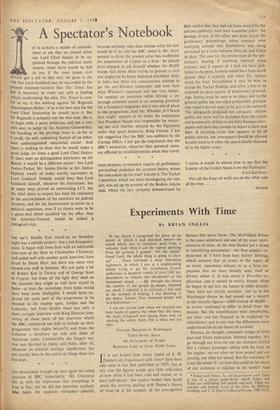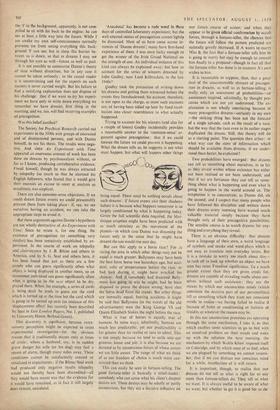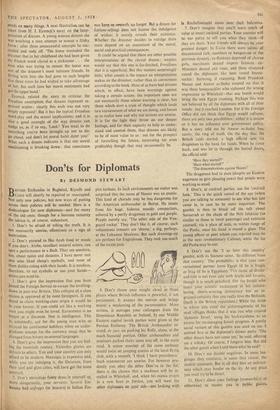Experiments With Time
By BRIAN INGLIS In my dream I recognised the place as an island of which I had dreamed before—an island which was in imminent peril from a volcano. And, when I saw the vapour spouting from the ground, I gasped : 'It's the island! Good Lord, the whole thing is going to blow up!' . . . There followed a most distressing nightmare, in which I was at a neighbouring island, trying to get the incredulous French authorities to despatch vessels 'of ever}!' and any description to remove the! inhabitants' of the threatened island. . . . All through the dream the number of the people danger obsessed my mind. I repeated it to everyone ,I met and, at the moment of waking, I was shouting to the Maire. 'Listen! Four thousand people will be killed unless—' I am not certain now when we received our next batch of papers, but when they did come, the Daily Telegraph was among them, and, on opening the centre sheet, this is what met my eyes: VOLCANO DISASTER IN MARTINIQUE TOWN SWEPT AWAY AN AVALANCHE OF FLAME PROBABLE Loss of OVER 40,000 LIVES IT is not known how many copies of J. W. Dunne's An Experiment with Time* have been sold since it was first published in 1927; but in any case the figures would give little indication of how often it had been read and reread, or at least half-reread : few readers bother their heads about the sections dealing with Dunne's theory of time—it is his account of his precognitive dreams that never bores. The Martinique dream is the most celebrated and one of the most repre- sentative of them. At the time Dunne put it down to 'identifying paramnesia'—the then popular ex- planation of 'I have been here before' feelings, which assumes that an event, or the report of an event, sometimes induces in us a false im- pression that we have already seen, read or dreamt about it. It was never a plausible ex- planation and it ceased to satisfy Dunne when he began to see into the future in other dreams. They were not strictly accurate : just as in the Martinique dream he had missed out a nought in the casualty figures-4,000 instead of 40,000— so events continued to differ in detail from the dreams. But the resemblances were remarkable, too close and too frequent to be explained by coincidence; and in any case the differences were understandable on the theory he evolved.
Dreams, he thought, contained images of both past and future experience, blended together, We go through our lives (to use the standard simile) like a railway passenger sitting with his back to the engine : we see what we have passed and are passing, not what lies ahead. But the conscious 'I' is not the whole T—or how else could we be aware of our existence in relation to the world? And * Faber and Faber, 5s. An Experiment with Time is one of a ,dozen paper-backs which Faber and Faber are publishing this month and next. These are reprints and include Lord of the Flies, by William Golding, and T. S. Eliot's Collected Poems, 1909-1935. the '1' in the background, apparently, is not com- pelled to sit with his back to the engine; he can see at least a little way into the future. While I am awake my own self-consciousness normally prevents me from seeing everything this back- ground '1' can see; but in sleep this barrier be- tween us is down, so that in dreams I may see through his eyes as well—future as well as past.
It is not possible to summarise Dunne's theory of time without distortion, but in any case it cannot be taken seriously : to the casual reader it is unconvincing and for the experts on such matters it never carried weight. But his failure to find a satisfying explanation does not dispose of his challenge : that if we want to try his experi- ment we have only to write down everything we remember we have dreamt, first thing in the morning, and we, too, will find recurring examples of precognition.
Was this belief justified?
The Society for Psychical Research carried out experiments in the 1930s with groups of interested and of disinterested persons, and with Dunne himself, to test his thesis: The results were nega- tive. And sinee An Experiment with Time appeared an enormous amount of work has been done on dreams by psychoanalysts without, so far as I know, producing corroborative evidence. Fretid himself, though he was always attracted by telepathy (so much so that he alarmed his English followers, who feared that it would give their enemies an excuse to sneer at analysis as occultism), was sceptical.
There are also common-sense objections. If we could dream future events we could presumably prevent them from taking place : if, say, we see ourselves having an accident, we can take the appropriate steps to avoid it.
But these arguments against Dunne's hypothesis are not wholly destructive of An Experiment with Time: Since he wrote it, for one thing, the existence of precognition (or something very similar) has been tentatively established by ex- periment. In the course of work on telepathy and clairvoyance by J. B. Rhine and others in America, and by S. G. Soal and others here, it has been found that just as there are a few people who can guess significantly often what object is being displayed in another room, so an occasional individual can guess significantly often what is going to be the next object to be dis- played there. When, for example, a series of cards is being dealt he tends to guess not the card which is turned up at the time but the card which is going to be turned up next (an instance of this 'displacement effect' has recently been described by Soal in East London Papers, No. 1, published by University House, Bethnal Green).
This discovery is significant, because extra- sensory perception might be expected to resist experimental investigation—for the obvious reason that it traditionally occurs only at times of crisis: where a husband, say, is in sudden grave danger his wife (or his dog) may feel a spasm of alarm, though many miles away. These conditions cannot be satisfactorily created or simulated in experiments : if the Rhine/Soal work had produced only negative results telepathy would not thereby have been discredited—all they would have meant was that the evidence for it would have remained, as in fact it still largely does remain, anecdotal. `Anecdotal' has become a rude word in these days of controlled laboratory experiment; but the well-attested stories of precognition cannot lightly be dismissed. Most of us have come across in- stances of 'Dunne dreams% many have first-hand experience of them. I was once lucky enough to get the winner of the Irish Grand National on the strength of one. An individual instance of this kind can always be explained away; but how to account for the series of winners dreamed by John Godley, now Lord Kilbracken, in the late 1940s?
podley took the precaution of writing down his dreams and getting them witnessed before the events they foreshadowed; his account, therefore, is not open to the charge, as most such accounts are, of having been tidied up later by fond recol- lection into closer resemblance to what actually happened.
Trying to account for his winners (and also for a couple of losers) Godley incidentally provides a reasonable answer to the 'common-sense' ar- gument against precognition : that if we could foresee the future we could prevent it happening. What the dream tells us, he suggests, is not what must happen, but what will happen other things being equal. There need be nothing occult about such•dreams : if future events cast their shadows before it is because what happens tomorrow is so largely conditioned by what is happening today. Given the full scientific data required, the Mar- tinique eruption might have been predicted \\ ith as much 'certainty as the movement of the planets—in which case Dunne was dreaming the future only in the sense that he might have dreamt the sun would rise next day.
But can this apply to a horse race? For :n racing the area in which other things may not be equal is much greater. Ballymoss may have been the best form horse two Saturdays ago, but acci- dent, colic or temperament before the race, or bad luck during, it, might have wrecked his chances. And if 'somebody had dreamed Bally- moss was going to win he might, had he been disposed to prove the dream wrong; have shot the horse dead frOni' the stands. But other things -are normally equal; barring accidents it might be said that Ballymoss (in the words of the old advertisement) won the King George VI and Queen Elizabeth Stakes the night before the race.
What is true of horses is equally true of humans. In some ways, admittedly, humans are much less predictable; yet our predictability is far greater than we realise or care to admit. This is not simply because we tend to settle into our grooves, home and job; it is also because we are dictated to by unconscious forces of whose nature we are little aware. The range of what we think of as our freedom of choice is much more con- stricted than we think. • This can easily be seen in fortune-telling. The good fortune-teller is basically a' mind-reader : somebody who can sense what his client's deepest desires are. These desires may be wholly or partly unconscious, but they are a decisive influinee on' our future course of action; and when they appear to be given official confirmation by occult forces, through a fortune-teller, the chances that the future will follow the pattern predicted arc naturally greatly increased. If A wants to marry Miss B, the fact that a fortune-teller tells him he is going to marry her may be enough to commit him finally to a proposal—though in fact all that the fortune-teller has done is to transmit A's own wishes to him.
. It is reasonable to suppose, then, that a great deal of the unaccountable element of precogni- tion in dreams, as well as in fortune-telling, is really only an assessment of probabilities—an assessment inspired, admittedly, by thought pro- cesses which are not yet understood. The ex- planation is not wholly convincing because in many precognitive dreams—certainly in my own —the striking thing has been not the forecast of a single episode, such as the result of a race, but the way that the race even in its earlier stages duplicated the dream. Still, this theoty will do as a starting point. The question then arises: in what way can the store of inforMation which should be available from dreams, if we under- stood them better, be exploited?
Two probabilities have emerged : that dreams can tell us something about ourselves, in so fat as thcy reveal wishes whose existence' has either not been realised or not been understood; and that if we are fortunate they can tell us some- thing about what is happening and even what is going to happen in the world around us. The temptation is to concentrate, as Dunne did, on the second; and I suspect that many people, who have followed his discipline and written down their dreams every morning have wasted much valuable material' simply because they have thought only of their precognitive possibilities. The sensible course is to watch dreams for any- thing and everything they reveal.
There is an obvious difficulty: that dreams have a language of their own, a weird language of symbols and masks and word-plays which is not easy to translate into everyday terms. But it is a mistake to worry too much about this, to rush off to look up whether an object we have seen has some Freudian significance. To a much greater extent' than they are given credit for, dreams are capable of revealing truths about our- selves without such assistance: they are the means by which our unconscious minds (which constitute the decisive part of our personalities) tell us something which they want our conscious minds to realise—we having failed to realise it because of habit or conditioning or laziness or timidity or whatever the reason may be.
In this our unconscious processes are operating through the same mechanism, I take it, as that which enables some scientists to go to bed with an unsolved problem on their minds and wake up with the solution the next morning; the mechanism by which 'Kubla Khan' imposed itself on Coleridge, and by which most of us find, when we are plagued by something we cannot remem- ber, that if we can distract our conscious mind for. a while, recollection of it will return.
It is important, though, to realise that our dreams do not tell us what is right for us any more than fortune-tellers do. They tell us what we want. It is always useful to' be aware of what we want; but whether to get it is good for us de- Pends on many things.. A neat illustration can be taken from H. J. Eysenek's essay on the inter; pretation of dreams. A young woman dreamt she was watching a man attempt to mount a frisky horse: after three unsuccessful attempts he suc- ceeded and rode off. 'The horse reminded the dreamer that in her childhood she had been given the French word cheval as a nickname . . . the man who was trying to mount the horse was One of the dreamer's most intimate friends. In flirting with him she had gone to such lengths that three times he had wished to take advantage of her, but each time her moral sentiments had got the upper hand.'
Eysenck related the story to criticise the Freudian assumption, that dreams represent re- pressed wishes: clearly this wish was not very deeply repressed! But it has the typical Freudian word-play and the sexual implications; and it, is also a good example of the way dreams can nudge us, as if to say, 'Look! you want .to do something you've been brought, up not to do; go ahead, and don't let moral habit deter you!' What such a dream indicates is that our moral• conditioning is breaking down: that conscience can keep us cowards nn.longer. But a dream (or fortune-telling) does not, license the indulgence of wishes; it merely reveals their existence. Whether the dreamer decides to indulge them must depend on an assessment of the moral, social and practical consequences.
It could be argued that there are other possible interpretations of the cheval dream : sceptics would say that this one is far-fetched, Freudians that it is superficial. But this matters surprisingly little; what counts is the impact an interpretation makes on the dreamer, rather than its correctness according to the book. Most of us have had dreams which, in effect, have been warnings against taking a certain action; the important ones are not necessarily those whose warning is clear, but those which start a train of thought which leads to a reassessment of what we are doing, and forces us to realise how and why our actions are unwise. It is for the light they throw on our deeper feelings, and for their capacity to help us under- stand and control Ahem, that dreams are likely to be of most value to us : not for the prospect of foretelling the future, interesting (or even profitable) though that may occasionally be.
































 Previous page
Previous page